By LISA EISENHAUER
Karen Green wasn't familiar with the concept of "period poverty" before the issue came up at a community event along with the idea for SSM Health St. Anthony Hospital — Midwest in Midwest City, Oklahoma, to fund dispensers to give away menstrual
hygiene supplies in the local public schools.
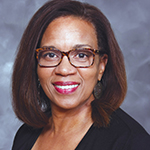
Green
Once she learned about period poverty — the condition of being disadvantaged due to menstruation — and the fact that even students in the blue-collar Mid-Del School District where the hospital is seated were affected, she was onboard with
the suggestion that the hospital provide assistance. So were her colleagues at SSM Health St. Anthony Hospital — Midwest who approved a grant of almost $38,000.
"Why wouldn't we make it better for students?" says Green, who is regional director of mission integration at SSM Health St. Anthony, a network of hospitals and clinics in and around Oklahoma City that is part of St. Louis-based SSM Health.
The hospital's gift covered the cost of 207 dispensers of period products that were installed in girls' bathrooms this fall. The district, with about 11,000 students, takes in a suburban region just east of Oklahoma City that includes Tinker Air Force
Base. In 2018-2019, the poverty rate in the district was 15.3%, according to a state report. The U.S. Census Bureau puts the
national poverty rate at 11.6%.
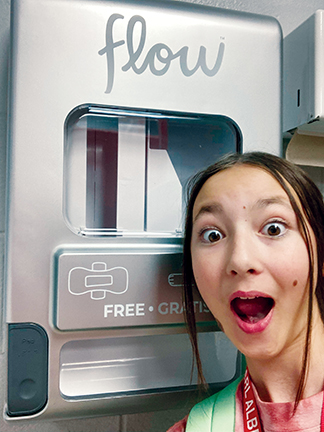
Charlee Barks poses for a selfie in front of a dispenser of free period products just after it was installed at her school. Charlee is the daughter of Lindse Barks, whose request for funding from SSM Health St. Anthony Hospital — Midwest led
to the dispensers being installed in grade and high schools in and near Midwest City, Oklahoma.
Green says: "The founding sisters of SSM Health St. Anthony were dedicated to serving Oklahoma's vulnerable and addressing the inequities of their time, just as we believe Mid-Del Schools is doing through this program today."
Hidden need
The grant from SSM Health St. Anthony Hospital — Midwest came at the request of Lindse Barks, director of the Midwest City-Del City Public Schools Foundation. The nonprofit raises private supportive
funding for the district.
Barks says she, too, was unfamiliar with period poverty until two years ago, when she was at an event where two teachers accepted a donation to purchase menstrual hygiene products. The products were for baskets the teachers were keeping stocked in a couple
of Del City High School bathrooms.
"As soon as I heard that, I knew immediately that this was something that the foundation can jump in on and we can help," Barks says.
Barks arranged a fundraising brunch that brought in $2,000 and a large haul of boxes of tampons and menstrual pads, which she donated to the district's six secondary schools. Perhaps more importantly, the event drew the attention of District Superintendent
of Schools Rick Cobb.
Cobb met with Barks to talk about the equity issues inherent in period poverty, such as that studies have shown that girls who are menstruating sometimes stay home from school because they can't afford period products.
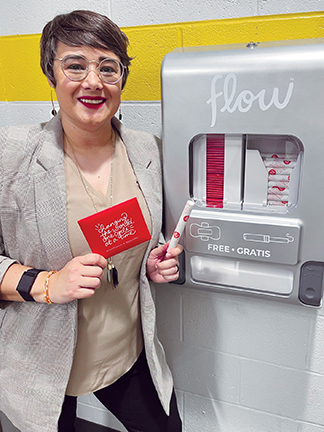
Lindse Barks' request for funding from SSM Health St. Anthony Hospital — Midwest led to dispensers with free period products being installed in grade and high schools in and near Midwest City, Oklahoma.
The superintendent pledged that, if the foundation raised the money to buy the dispensers, the district would cover the cost of keeping them stocked. Barks remembers calculating, based on what the brunch brought in, that it would take as long as 10 years
for the foundation to get the dispensers into girls' bathrooms in all of the district's elementary, middle and high schools.
With SSM Health St. Anthony Hospital — Midwest's funding, Barks cut the time line down to a few months. In September, the Mid-Del School District became the first in the state to install free period product dispensers. The products also are available
in counseling offices at the schools. Previously, the schools did not have any period product dispensers.
The foundation chose to buy the dispensers from Aunt Flow, a company that makes period products and dispensers, but only dispensers that give the products
away free. Aunt Flow donates one product for every 10 sold to organizations that supply period products to women in need.
Addressing the stigma
Jennifer Gaines is program director of the Alliance for Period Supplies. Gaines
says the nonprofit works to meet a significant need for period products across the nation. Founded in 2018 as an offshoot of the National Diaper Bank Network, the alliance supports 130 independent organizations that give away the products.
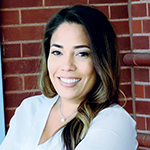
Gaines
Gaines says that while organized efforts to alleviate period poverty are relatively new, the problem isn't. "It's always been this silent crisis because of simply the stigma of talking about periods and the stigma of not having enough money and living
in poverty and not being able to access the basic necessities that you need," she says.
The Alliance for Period Supplies cites a 2021 study by period
product maker Kotex that found two in five people who menstruate have struggled to buy period supplies. (One of Kotex's product lines, U by Kotex, is a founding sponsor of the alliance.) The study found that the rate is even higher for those who
are Black or Hispanic.
The alliance gives organizations within its network technical support, such as advice on how to secure warehouse space and set up boards of directors, and development grants for building websites, hiring staff and more.
The alliance also advocates for policies to address period poverty. Among the legislation it encourages is removal of sales taxes on period products, requiring public places such as libraries and courthouses to supply the products at no cost, and
mandating age-appropriate menstrual health education in schools. It also urges government funding to cover the cost of period products for low-income people. The products are not covered by programs such as the federal Supplemental Nutrition Assistance
Program.
Gaines say she knows the needle is moving on awareness of period poverty based on the growing number of inquiries that the alliance gets from people who want to help with or to start product giveaway programs and because of the uptick in the passage
of related laws. The alliance keeps track of those measures, such as the ending of the so-called "tampon taxes" in Virginia this summer. Only 22 states continue to have sales taxes on menstrual hygiene products, the alliance says.
When it comes to period poverty and menstrual equity, Gaines says, "I think in general we've just been seeing the environment becoming a little more friendly to bringing up the topics."
Breaking barriers
At least one other Catholic health care system has launched a recent effort around period poverty. Mercy Health — Lourdes Hospital in Paducah, Kentucky, in August started a program to provide
free feminine hygiene products. The products are available in "period starter kits" that the hospital is supplying to Mercy Health OB-GYN and pediatrics practices as well as to local public schools.
A grant from Mercy Health Foundation — Lourdes funded 1,000 of the kits, which contain about three months' worth of period supplies. The grant also covered books on women's health that are available to students, teachers and coaches. Mercy Health
— Paducah is part of Bon Secours Mercy Health.
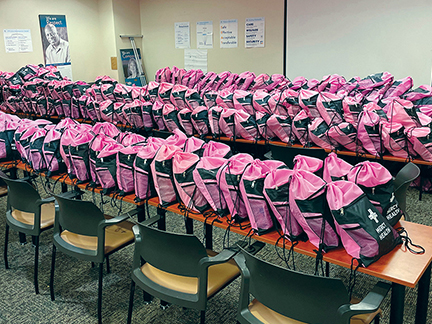
Bags with period products await distribution at Mercy Health — Lourdes Hospital in Paducah, Kentucky. The bags are being given away through OB/GYN and pediatrics clinics and local schools.
In a news release about the program, Meghan Lee, Mercy Health — Paducah OB-GYN nurse practitioner, says: "Our aim is to promote broader self-esteem and self-confidence as our young women transition into adolescence and also ensure that girls
don't miss school due to a lack of feminine hygiene products."
Barks says she saw genuine excitement among teachers, administrators and students at the pep rally-like event the Mid-Del School District hosted to announce that the period product dispensers were being installed. She also saw the delight in her own
eighth-grade daughter, who sent Barks several selfies in front of a dispenser at her school.
Since the dispensers went in, Barks has gotten queries from representatives from other districts in the state including the two largest — Oklahoma City and Tulsa — about how Mid-Del School District succeeded.
She is tickled about the impact the project she helped spearhead appears to be having. "We're creating equity for our students," Barks says. "We're breaking down walls and breaking down boundaries and that for me is a big thing."
When professor found no research on period poverty in U.S., she did her own
Anne Sebert Kuhlmann was helping to evaluate the impact that providing period products to students in Northern Ethiopia had on their school attendance when she and a research assistant decided to search for similar studies across the globe.
The resulting systemic review, published in 2017, found no studies had been done in the United States or other high-income nations.
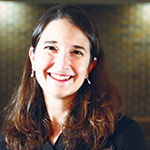
Kuhlmann
"There was no data about whether this was an issue or not," Sebert Kuhlmann says of that search across academic publications. "It sort of planted a seed for us, thinking about, well, wouldn't this probably be an issue for those here who are
struggling to get by?"
Sebert Kuhlmann is associate professor and interim department chair of behavioral science and health education at Saint Louis University's College for Public Health and Social Justice. The finding about the lack of research into period poverty
in the United States prompted her to set up her own study with funding from the St. Louis-based Incarnate Word Foundation, a charity affiliated with the Sisters of Charity of the Incarnate Word.
The study focused on 184 low-income women in St. Louis
who got services from any of 10 nonprofit organizations. It found that almost two-thirds of them were unable to afford needed period products in the previous year and that one-fifth of them experienced this monthly. It concluded that menstrual
hygiene supplies are a basic necessity that many low-income people lack.
"We published those results in January of 2019, and that was really the first data from the U.S. showing that this was an issue," Sebert Kuhlmann says.
She since has collaborated on two published studies on period poverty among female high school students in Saint Louis Public Schools and in a nearby district, both of which have a high rate of poverty. Some of her findings compared to what was seen in developing countries, such as the percentage who reported having trouble affording period products and missing school
because of their periods. Many of the students also said they would like more information and education regarding managing periods and personal hygiene.
While Sebert Kuhlmann is hopeful that her research will lead to assistance for people who can't afford period products, she says the studies also pointed to other needs related to menstruation that especially impacted those with little means.
Many of those she studied, for example, said challenges such as managing cramps or accessing clean restrooms to practice good hygiene affected their lives.
In the few years since Sebert Kuhlmann began her research into period poverty in the U.S., she says much attention has been focused on the subject. Many organizations have begun to provide free products to those in need. Lawmakers have picked
up on the issue, with some states and cities passing laws to make the purchase of period products tax free and to require that public places such as schools provide free menstrual products.
Sebert Kuhlmann often gets interview requests about her research, many of them from high school journalists.
She is hopeful now that a once-ignored topic is getting due consideration. "I think it's actually been amazing to watch and to be a part of how much the discourse has changed in just a few years," she says.
— LISA EISENHAUER